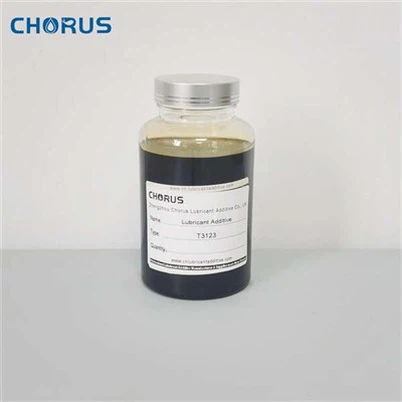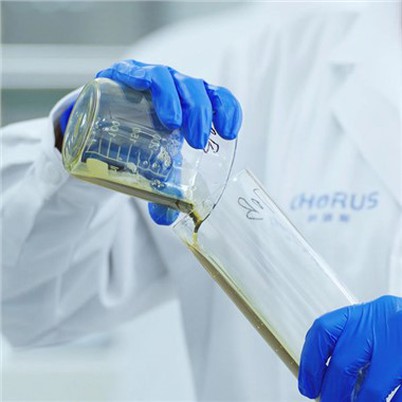What lubricant additives does hydraulic oil have?
Leave a message
The performance of the hydraulic base oil is far from meeting the various requirements of the hydraulic system. We should add various additives to improve the performance of the base oil. Almost all types of hydraulic oil used in hydraulic systems contain various functional additives.
The additives of hydraulic oil mainly include oiliness additive, antiwear additive, viscosity index improver, antifoamer, pour point depressant, antioxidant, rust preventive, antifungal additive, demulsifier, and metal deactivator, etc.

1. Oiliness Additive
Oiliness Additive is a kind of substance with strong polarity. Under lower temperature and pressure, it can adsorb on the metal surface to form a firm adsorption film, prevent direct contact between metal and metal, improve the strength of the oil film, and reduce the friction and wear of metal.
In hydraulic oil, commonly used oiliness additives are: oleic acid, vulcanized whale oil, vulcanized cottonseed oil, vulcanized olefin cottonseed oil, dimeric acid, and so on.
2. Extreme Pressure / Antiwear additive
Under the high temperature of friction, the decomposition products of the Extreme Pressure / Antiwear additive react with the metal surface to produce a compound film with low shear stress and low melting point, which prevents the occlusion or welding of the contact surface, and the resulting plastic deformation fills up the gap between the friction surfaces. The uneven part increases the contact surface, reduces the pressure, and reduces the wear.
In antiwear agents, sulfur, phosphorus, and chlorine are usually contained, and their compounds have their own characteristics. Sulfur-containing anti-wear agents, under high-temperature friction conditions, sulfides react with iron to form iron sulfide films, which play an anti-wear role; phosphorus-containing anti-wear agents, The products of thermal decomposition of phosphate esters interact with steel. Produces a low melting point, high plastic phosphate mixture, which acts as an anti-wear agent; chlorine-containing anti-wear agent, under extreme pressure conditions, produces a ferric chloride film, which is a layered structure with a small friction coefficient and is easy to shear, good lubrication.
In hydraulic oil, commonly used antiwear agents are zinc dialkyl dithiophosphate (T203), tricresyl phosphate, thiophosphate, sulfurized olefin (T321), chlorine Chemical paraffin, etc.
3. Viscosity Index Improver
Viscosity index improver is an additive to improve the viscosity-temperature performance of hydraulic oil and increase its viscosity index. This is a high polymer, when the temperature is low, in the oil, the VII molecules shrink and curl into tight balls, and the viscosity of the hydraulic oil does not change much, when the temperature is high, the VII molecules swell and stretch, increasing the hydraulic pressure oil viscosity.
In hydraulic oil, commonly used thickeners are: polyisobutylene (PIB), ethylene propylene copolymer (OCP), polymethacrylate (PMA), etc.
4. Antifoaming Additives
Anti-foamer is a kind of additive that can reduce the stability of foam adsorption film and shorten the existence time of foam. Adding anti-foaming additive to hydraulic oil can reduce the surface tension, so that the bubbles can quickly overflow the oil surface, thereby eliminating the bubbles. the
In hydraulic oil, commonly used antifoaming additives are: dimethyl silicone oil, polyester non-silicon antifoaming agent, metal soap, fatty acid, etc.
5. Pour point depressant
The pour point depressant is a kind of additive that can inhibit the paraffin in the oil from forming a network crystal, lower the freezing point, and maintain the fluidity of the oil. The agent changes the crystal shape and size of paraffin wax by adsorbing or forming eutectic crystals on the surface of paraffin wax crystals, thereby reducing the freezing point of oil products. the
In hydraulic oil, commonly used pour point depressants are: alkyl naphthalene, polymethacrylate (PAM PPD), alpha-olefin copolymer, ethylene vinyl acetate polymer, etc.
6. Antioxidant
Antioxidant is a kind of additive that is easily oxidized by itself and can form a complex film on the metal surface to isolate the contact with oxygen and other corrosive substances and prevent the metal from oxidizing the oil and the oil from corroding the metal.
Generally, several antioxidant additives are used in combination, and the antioxidant effect is better.
In hydraulic oil, commonly used antioxidants are: 2,6-di-tert-butyl-p-cresol (T501), N-phenyl-α-naphthylamine, isobutylene sulfur (T321), dialkyldithioamino formate, aromatic hydrocarbons, bisphenols, etc.
7. Rust inhibitor
Rust inhibitors are a class of polar compounds that can form a strong water-repellent adsorption film on the metal surface to prevent metal from rusting.
In hydraulic oil, commonly used rust inhibitors are: dodecenyl succinic acid, dinonyl naphthalene sulfonate, etc.
8. Bactericide Additive
Bactericide additives can prevent and inhibit the emulsified oil from producing mold.
In hydraulic oil, commonly used antifungal agents are: phenolic compounds and formaldehyde.
9. Demulsifier
Demulsifiers are substances that can separate or settle water and oil.
In hydraulic oil, commonly used demulsifiers are: polyether polymer compounds and various polymers of ethylene oxide and propylene oxide.
10. Metal Deactivators
Metal Deactivators are a kind of additives that can protect non-ferrous metals, especially copper surface corrosion. It can also increase the oxidation resistance of oil and inhibit and passivate the corrosion of copper by acidic substances.
There are two types of metal deactivators used in hydraulic fluids:
One is a film-forming passivation agent, which can form a complex film with the copper surface to prevent the erosion of acids, active sulfides, and corrosive extreme pressure agents. Commonly used are benzotriazole (T706);
The other is an active sulfur scavenger, which reacts with active sulfides to form low-corrosion or non-corrosive polysulfide compounds.






